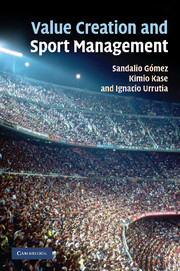Book contents
- Frontmatter
- Dedication
- Contents
- List of figures
- List of tables
- List of contributing authors
- Foreword
- Introduction
- 1 The virtuous circle of value creation in the sports industry
- 2 Value creation and performance criteria for sport entities
- 3 National context and profit strategy of the sport entity
- 4 Value creation in two of the most prestigious Spanish football clubs
- 5 The proto-image of Real Madrid
- 6 Value creation from the organizational structure of a sports entity
- Appendix I Why NGOs matter for the success of sporting events
- Appendix II Strategic evaluation of sponsorship and patronage
- Appendix III Structural characteristics of sport organizations
- Index
- References
4 - Value creation in two of the most prestigious Spanish football clubs
Real Madrid CF and FC Barcelona, 2000–2006
Published online by Cambridge University Press: 05 February 2014
- Frontmatter
- Dedication
- Contents
- List of figures
- List of tables
- List of contributing authors
- Foreword
- Introduction
- 1 The virtuous circle of value creation in the sports industry
- 2 Value creation and performance criteria for sport entities
- 3 National context and profit strategy of the sport entity
- 4 Value creation in two of the most prestigious Spanish football clubs
- 5 The proto-image of Real Madrid
- 6 Value creation from the organizational structure of a sports entity
- Appendix I Why NGOs matter for the success of sporting events
- Appendix II Strategic evaluation of sponsorship and patronage
- Appendix III Structural characteristics of sport organizations
- Index
- References
Summary
Introduction
An in-depth analysis of the value-creation models used by Spain's leading football clubs is conducted in contrast to those of other European clubs. Assessment is made of the results brought about by these models. Using the sport-emphasis and business-emphasis matrix, an explanation of the context in which the models are positioned is provided in an effort to generalize the findings from the analysis.
In contrast to the English, German and Italian football championships, Spain does not have its own value creation model. Yet despite this, Real Madrid and FC Barcelona are, without doubt, two of the European clubs that have generated the most income in 2006, and, moreover, that have shown consistent progression in their results over the last two years (Deloitte, 2008). Nevertheless, throughout the period 2000–2006, Real Madrid CF and FC Barcelona have used different strategies, with different results. The former, despite some triumphant years in the sporting world, has failed to achieve any important win in the last three years at all. Yet it has been recognized as the world's richest football club. As for FC Barcelona, following the difficult presidency of Joan Gaspart (2000–2003) – memorable for both his sporting and financial failures – the Catalan club, under the leadership of President Laporta, has taken back the sporting lead. Over the past two years FC Barcelona has won the UEFA Champions League once and the Spanish national premiership (‘La Liga’) two years in a row, initiating a return to financial health at the same time.
- Type
- Chapter
- Information
- Value Creation and Sport Management , pp. 103 - 144Publisher: Cambridge University PressPrint publication year: 2010



